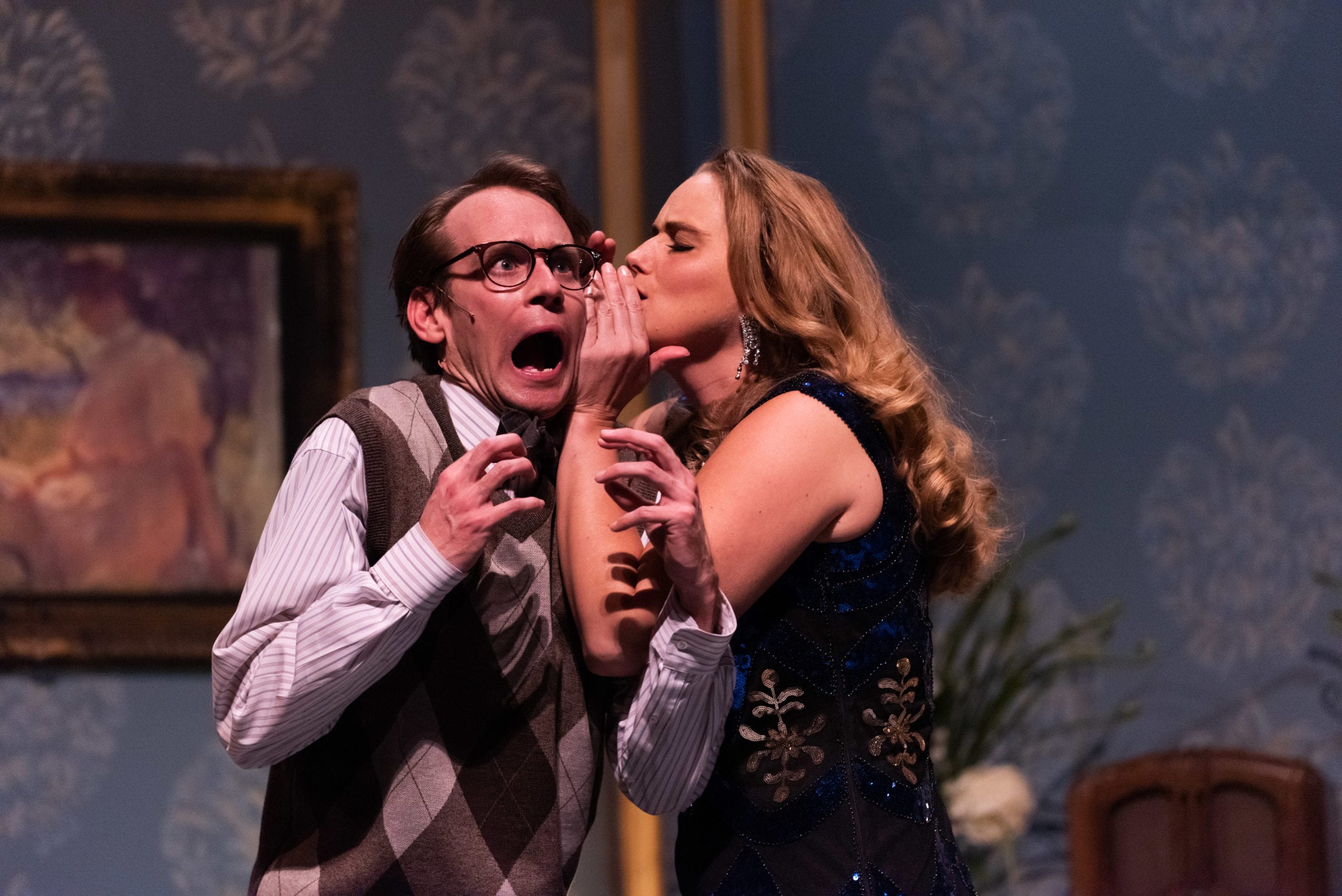CENTERVILLE — Lend Me a Tenor, by Ken Ludwig, is a fun comedic show based in 1934 Ohio as the Cleveland Grand Opera prepares to welcome a famous tenor, Tito Merelli, played by Josh Curtis, to star in a production of Otello. When a mistake leaves Merelli unable to perform, the cast scrambles and hilarity ensues.

The CenterPoint production is directed by Jennie Richardson, who announced in the program that because she is moving, Lend Me a Tenor will be her last production at CenterPoint. As the curtain rose, the set, designed by Scott Van Dyke, was an elaborate replication of exactly how I would imagine a luxury suite in a 1930’s hotel to appear. From the nice details on the walls to the fancy furniture, I was quite taken by the whole spectacle. Lighting design by Jordan Fowler was only a small part of the technical elements of this show, as was sound and technical design by Derek Walden, but both elements ran smoothly throughout the production and kept the visual and auditory aesthetic strong.

As a story, Lend Me a Tenor took a while to engage me. Assistant to the Opera director, Max, played by Andrew Heyward, is tasked with keeping his boss, Saunders, played by Mike Brown, calm as they wait for the arrival of the acclaimed tenor, Tito (Curtis), to perform in the Ohio opera production of Otello. Heyward plays an accurate and amusing assistant, afraid to make a misstep. Heyward is skilled at appearing nervous and apprehensive. Add in the complication of dating the bosses daughter, Maggie, played by Natalie Peterson, and Max (Heyward) has the opportunity to be the character that tries to balance and maintain the chaos. Heyward proves to be a capable actor for the part, and was enjoyable in the role.
The story begins to pick up the pace with the entrance of Curtis as Tito and especially Holly Reid as Tito’s wife, Maria. Reid has a fantastic stage presence, and her characterization of Maria reminded me exactly of my good Italian friend who taught me to stand up for myself just as Maria delightfully did to the slightly arrogant Tito. Then Curtis as Tito had a wonderful scene with the awkward Heyward as Max, where Tito imparted wisdom and confidence and helped Max become brave and capable. Add to the scene the two delightfully utilizing physical comedy, and the scene easily becomes my favorite part of the first act.

After the slow start, the second act of the production certainly picks up steam and humor, and was more captivating than the first. Mistaken identity and a bit too much medication leaves Max with his moment on the stage and him suddenly being fawned over by several ladies, and Max’s awkward way of dealing with the newfound attention was endearing. Several fun scenes of confusion and slapstick humor followed, and the cast did well with the humor and timing. However, because of the writing, the show still felt dry and overdone, almost as if I had seen this story done several times and was not sure what to think of this new installment. Simple jokes like Tito and Max (both dressed as Othello) getting mixed up were amusing the first few times, but got dull as the act continued.

The show introduced three more minor characters: a Bellhop, played by Silas Stott, hoping to get the attention of the star to show off his own talent, a diva Soprano Diana, played by Amanda Morgan, hoping to use the star to catapult her own fame, and an opera committee member, Julia, played by Jan Smith, wanting to get Tito to show off for the patrons of the opera. While Stott gives a charming and astute performance, the other two felt slightly overstated in their portrayal. The soprano was meant to be a flirt, but the overstatement in this effort was very noticeable. I enjoyed more her portrayal of wanting to be noticed for her talent and her amusement with Tito’s confusion in their discussion. The opera committee member was meant to be amusing in her own flirtation with Tito because of the obvious age difference, but it came across as more awkward than entertaining. The two were still humorous, but I would have liked to see their performances toned down slightly.
Lend Me a Tenor follows the classic slapstick humor that has guided many comedic works of a similar nature, and the show certainly brought a smile to my face. However, it is slow in the execution of the story and feels overdone. The technical elements of the show are fantastic and the cast executes the material well. However the pace and writing left the production lacking and not as strong as other productions recently featured at CenterPoint.
[box]Lend Me a Tenor plays nightly (except Sundays) at 7:30 PM and Saturdays at 2:30 PM through February 16th on the Barlow Main Stage at CenterPoint Legacy Theatre (525 North 400 West, Centerville). Tickets are $19.50-27. For more information, visit www.centerpointtheatre.org.[/box]
